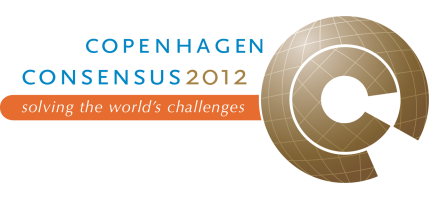Background
SOLUTIONS TO GLOBAL CHALLENGES
In 2012, the Copenhagen Consensus Center's flagship project provides an answer to the question:
If we had an extra $75 billion to put to good use, which problems would we solve first?
This is more than just an intellectual exercise; it is a way to identify the areas of spending where we could achieve the most good, and to bring more attention to them. It is also a way of identifying areas where there isn't enough research, or where the benefits are not as big as we might assume.
The project, a culmination of 18 months of planning, research-writing and preparation, builds on the success of two past Copenhagen Consensus projects.
The examination of the smartest solutions to global challenges was always intended to be repeated every four years, because of fast-moving changes in the state of knowledge about challenges and their solutions.
Following the same format as past Copenhagen Consensus projects, first, the Center commissioned Research Papers on the costs and benefits of solutions to ten different global challenges. Two sets of papers - 'Assessment Papers' and 'Perspective Papers' - were commissioned, to ensure that there was a range of expert points-of-view.

As in the previous two Copenhagen Consensus conferences, an Expert Panel of economists - including four Nobel laureates - examined all of the research presented here, and met with the lead authors in May 2012.
After deliberations, the Expert Panel created a prioritized list of solutions to the ten challenges, showing the most cost-effective investments. As in the past, the Center expects that this list will be utilized as an input by donors, governments and philanthropists.
In addition to the Nobel Laureate meeting, a parallel Student Forum was held focusing on the challenges relating to health economics in developing nations.
The 2012 Copenhagen Consensus was funded by the Danish state and the Rush Foundation.

